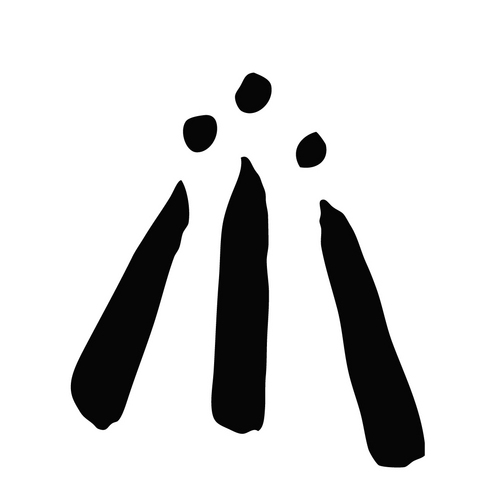My wife and I recently travelled from our home in India to meet some new friends in Seattle. I had been conversing with Honorable Moss, of The Order of Bards, Ovates and Druids (OBOD) for some time via email about various spiritual matters and when the opportunity presented itself for me to meet him, and the group he worked with in person, I took it! My arrival in Seattle was warmly welcomed. Gatherings were planned by Nicole, a member of the OBOD Druidic group, starting from a weekend at Port Townsend and followed by evening gatherings on the working days. A highlight of this experience was meeting real Bards.
My studies, and the studies of other learned scholars, confirm that the ancient Indian social structure was similar to that of Celts / Pagans. There are even Druids, Ovates and Bards in India . In this column, I am keen to write a little on the Bards of India.
The most important aspect of this study is that in India too they are called Bards. The Bards in the Celtic countries had an important role to play and they were mostly patronized by the ruler kings and worked in the King‘s court. They were poets and entertainers and among other things would work to keep the Kingship informed.
In India too most of the Hindu Kings had Bards in their court. The most important of the various categories of Bards were known as ‗Barath‘, ‗Barot‘, ‗Barhath‘ or ‗Birdavalo‘ who would write and sing songs in praise of heroes, saints and patrons. Their vision, sensibility and wisdom made them serve as advisors to the Kings. They were also instrumental in exciting the minds of the people and the army, leading them to war, whenever it was the need of the hour, to defend the native land against the foreign invasion and also to defend the honor of their women.
The important casts of Bards that live in my home state ―Rajasthan‖ are called ‗Charan.‘ They are highly sacred and revered because of their huge literary sense, martyrdom, deep loyalty and bravery in war. Charan‘s are also believed to be good poets as well as soldiers. It was considered a matter of prestige and pride for a king to have a ‗Charan‘ in his court. The society – including the Kings – considered the Charan caste as sacred and divine. Since women are loved and honored as Mother Goddesses, the Charan men are considered as the `Son of Goddesses`. The status of this caste is so high in the society it was considered as a matter of pride and prestige for the kings to have a Charan in his court. The Charani (Bard) literature is sub divided into 13 genres and these are as follows:
1. Songs in praise of gods and goddesses (stavan)
2. Songs in praise of heroes, saints and patrons (birdavalo)
3. Descriptions of war (varanno)
4. Laments for dead warriors, patrons and friends (marasiya or vilap kavya)
5. Praise of natural beauty, seasonal beauty and festivals
6. Descriptions of weapons
7. Sayings about didactic and practical cleverness
8. Ancient epics
9. Rebukes of wavering great kings and men who use their power for evil (upalambho)
10. Mockery of a standing treachery of heroism (thekadi)
11. Love stories
12. Songs in praise of lions, horses, camels, and buffalo
13. Songs describing the anguish of people in times of famine and adversity
Among the famous Bards who were titled ‗Bardai‘ was Chand Bardi.(1149-09-30) He was the court poet of the Indian King Prithviraj III Chauhan, who ruled Ajmer and Delhi from 1166-1192 CE. Chand Bardai was not only a court poet but was a member of the inner circle of the King. The poet accompanied the King during wars and remained fiercely loyal. When Prithviraj lost and was taken to Afghanistan by Mohammad Ghori, Chand Bardai accompanied him. What happens after this is clear from the local folk songs still prominent in Rajasthan. It is said that Prithviraj was taken to Afghanistan along with his friend, Chand Bardai. Then Ghori blinded Prithviraj Chauhan as Prithviraj refused to lower his eyes in front of Ghori. In Ghori’s court, Prithviraj was brought in shackles. Ghori had heard of the art of archery, wherein Prithviraj could aim and shoot just by hearing the sound. Ghori demanded he show him this art.
Chand Bardai says, “A King, though as a prisoner, can receive command only from a King. So it would be an honor if you command Him to shootâ€. Then he says few verses or poetry, few of those lines were, “Char baans chobis guz, aangal asht pravan, ta uppar sultan hai, mat chook Chauhanâ€.
‗Chaar baans‘ meant ‗four bamboos stick.‘
‗Chaubis guz‘ as approximately ‗24 yards.‘
‗Aangal asht praval‘ meant ‗eight fingers width.‘
All this combined gave the exact location of Ghori sitting on his throne (i.e. 4 bamboos stick high, 24 yards away and exactly eight fingers up was the Ghori sitting).
“Go ahead O Chauhan and don’t miss the aimâ€. With these directions, Prithviraj successfully shot and killed Ghori in his court. Seizing opportunity, Prithviraj and Chandra Bardai killed each other with daggers before the body guards of the late Ghori could do so.
An interesting aspect of Charans is their worshipping of the Goddess Karni Mata, considered to be the reincarnation of Goddess Durga, located at Deshnok near Bikaner in Rajasthan State and is the only temple of rats in the world. Goddess ―Karni Mata‖ temple is the temple of Bards of India.
By Honorable Surendra Mathur



